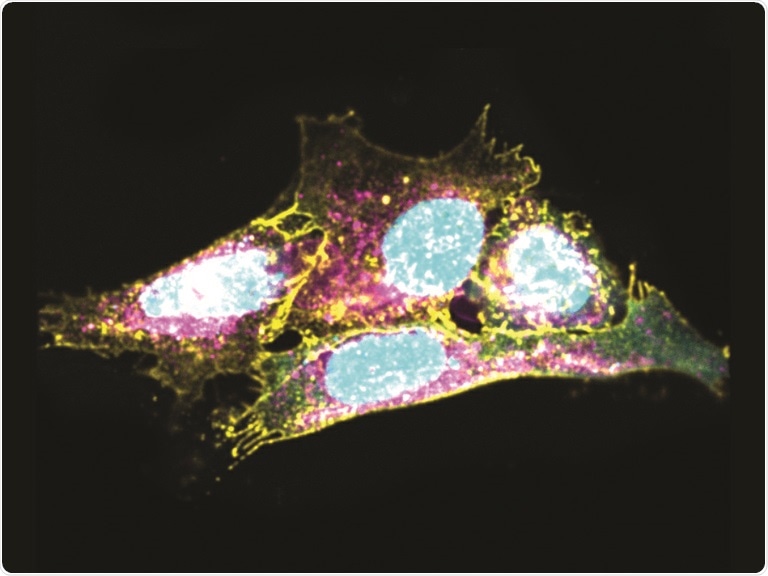According to a new study headed by the University of Bonn, a genetic disposition that is involved in the development of the heart in the embryo also seems to play a major role in the human immune system.

The image shows cells in which Creld1 was labeled with a yellow dye to show their localization in the cell. Image Credit: Lorenzo Bonaguro.
When the gene is not sufficiently active, the immune defense system goes through typical changes, which cause it to lose its effectiveness. Physicians speak of an aging immune system, as an analogous effect can usually be seen in older individuals. In the medium term, the outcomes may help decrease such age-related losses. The study has been published in the Nature Immunology journal.
To date, the gene with the mysterious abbreviation CRELD1 has been an enigma to science. Scientists already know that this gene plays a significant role in the development of the heart in the embryo. But the CRELD1 gene continues to be active even after birth—studies have demonstrated that it is frequently produced in almost all cells of the body. But for what purpose was not completely known before.
To answer this question, the researchers from the University of Bonn employed a novel method. Presently, scientific studies with human participants generally comprise the supposed transcriptome analyses. Through these means, it can be easy to establish which kinds of genes are active and to what level in the respective test subjects.
Moreover scientists are increasingly making the acquired data available to collaborators, who can subsequently use it to work on entirely different matters.
“And this is exactly what we did in our study,” stated Dr Aschenbrenner from the LIMES Institute at the University of Bonn and also a member of the ImmunoSensation² Cluster of Excellence.
At present, Aschenbrenner is doing her habilitation in the Genomics and Immunoregulation group of Professor Dr Joachim Schultze. Along with her collaborators, she integrated transcriptome data obtained from three different studies.
This provided us with information on the activity of the genetic material, including the CRELD1 gene, of a total of 4,500 test subjects. In addition, the data for these participants also included information on certain immunological parameters, such as the number of different immune cells in their blood.”
Dr Anna Aschenbrenner, LIMES Institute, University of Bonn
CRELD1 is less active in some people
When studying this data, the team found an unexpected correlation—all the 4,500 analyzed test subjects included a few individuals in whom the CRELD1 gene was considerably less active for some reason.
Fascinatingly, the blood of such donors was noted to contain only a minimal number of the supposed T cells. Such cells play a significant role in combating infections; a few of them identify virus-infected cells and destroy them before they get a chance to infect other cells.
The team additionally studied this association in mouse experiments. The outcomes demonstrated that the genetic loss of the Creld1 gene was actually responsible for causing the loss of T cells. Creld1T-deficient T cells mostly lose their capability to propagate and thus die earlier.
Aschenbrenner emphasized that, “We see similar changes in people with an 'aged' immune system.” Such a phenomenon, known as immunosenescence, is primarily seen in older individuals. People who are affected are relatively more vulnerable to infections, as recently discussed in the context of the COVID-19 infection, but perhaps also to age-related disorders, like Alzheimer’s or cancer.
It is already known that the activity of various genes in the blood is changed in a typical manner, which specialists also call it as an immunological aging signature.
We found precisely this signature among participants with low CRELD1 activity.”
Dr Anna Aschenbrenner, LIMES Institute, University of Bonn
Centenarians with a young immune system
Remarkably, the immune system of certain people ages relatively faster than others. For example, there are centenarians who are many decades younger, from an immunological standpoint. With regard to others, the power of the body’s own disease defense system already reduces considerably in the center of life.
Now, the team is hoping that the CRELD1 gene will offer them a key to gain a better interpretation of the causes of immunological aging.
The long-term goal is to slow down or halt this process. This could perhaps significantly reduce the risk of illness in seniors.”
Dr Anna Aschenbrenner, LIMES Institute, University of Bonn
Source:
Journal reference:
Bonaguro, L., et al. (2020) CRELD1 modulates homeostasis of the immune system in mice and humans. Nature Immunology. doi.org/10.1038/s41590-020-00811-2.